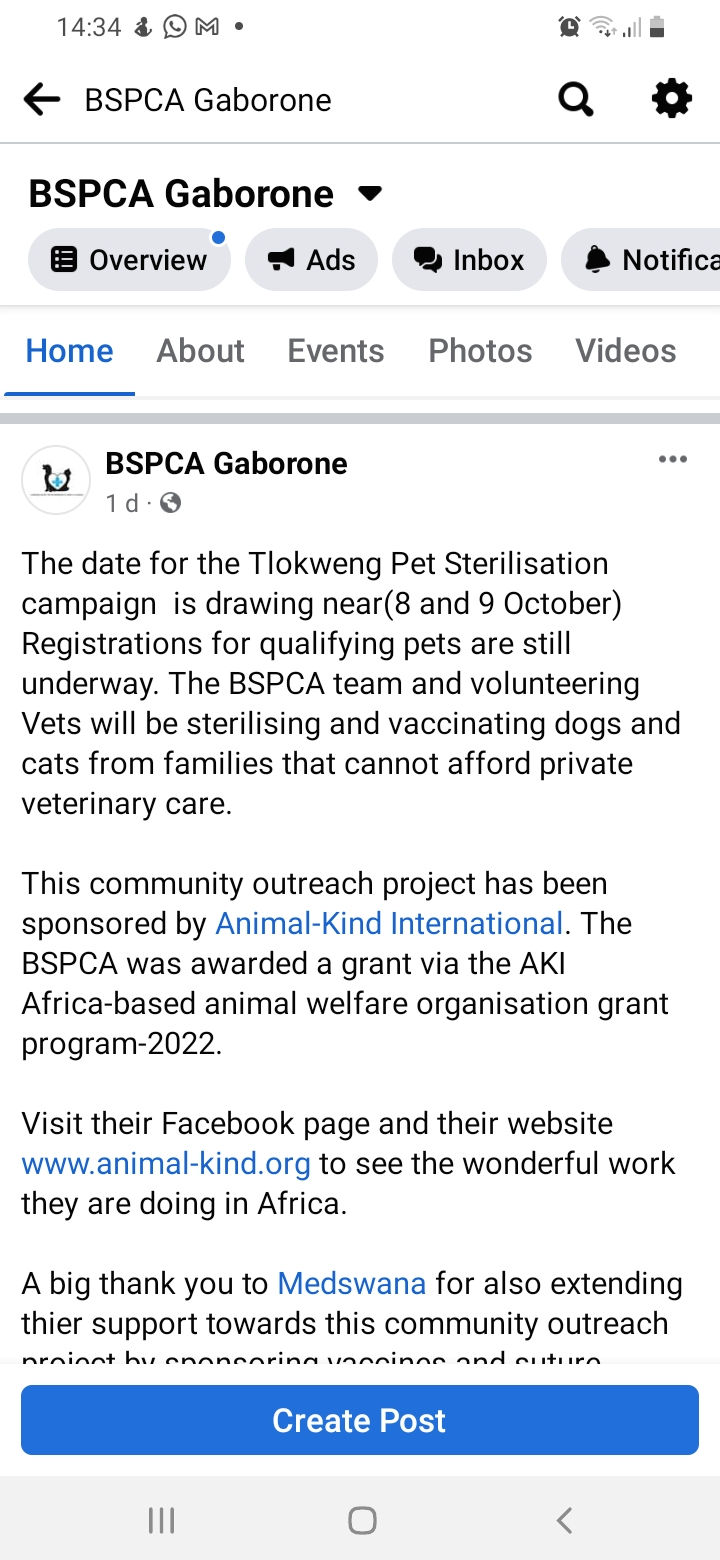Botswana SPCA's Spay/Neuter Grant Project: Kick-Off!
- Animal-Kind International

- Oct 9, 2022
- 3 min read
The Botswana Society for the Prevention of Cruelty to Animals kicked off their Africa-Based Animal Welfare Organization Grant Project, Pet Sterilization Campaign, in August and continued the planning phase through September. This is a report on their progress to-date. It's a great example of how to plan a well-organized spay/neuter campaign!
The BSPCA's Pet Sterilization Campaign will take place in Tlokweng, 13 km from the BSPCA's shelter. First, Kenneth (BSPCA National Manager) and Tumelo (Senior Animal Welfare Inspector) met with the Chief of Tlokweng village to request permission to hold the sterilization campaign and conduct door-to-door sensitization. Verbal permission was given and then a formal meeting was held at the Main Kgotla (traditional court) on September 1, where Kenneth Ditshweu and Zane Thero (Animal Welfare Inspector) addressed the chief and villagers, explaining what the BSPCA does and the importance of sterilizing and vaccinating pets.
From August 27 to September 21, the BSPCA went door-to-door to let people know about the campaign, the benefits of sterilization, the risks of surgery, animal welfare in general and basic pet care, and to register pets to participate in the sterilization campaign.

The BSPCA used a questionnaire to find out if families had a private vet that they use, and their socioeconomic status to determine if they were eligible for BSPCA's sterilization project, which is targeting low income families.
Thanks to BSPCA staff members for successfully carrying out the sensitization: animal caretakers (Boemo, Thapelo, Thapelo Jr, Phiri, Tshegofatso), bookshop coordinator (Onkhemetse), vet assistants (Keneilwe and Tebogo), assistant staff supervisor (Saebelo) and administration (Boitshoko), and led by the inspectors (Tumelo, Thero and Lesego). This wasn't only a learning experience for the villagers, but also for the BSPCA staff!
Then, from September 22-29, the BSPCA held dog dipping days for dogs who had already been registered for s/n. The dipping program was done to reduce tick and flea burden as they get close to the sterilization date-to make sure the pets were in as good condition as possible and could withstand surgery. The dipping program also helped remind people of the dates of the sterilization campaign.




The dipping program wasn't only for already registered pets. Families who missed registration during the sensitization phase could get their pets dipped and register for s/n, as well.

The preparation phase was very successful with:
217 dogs and 16 cats registered for s/n (of these 36 dogs were registered during dipping)
147 homes visited for the door-to-door sensitization
80 dogs dipped to-date
10 veterinarians confirmed that they will attend the event
BSPCA vet, Dr. Rumbi, purchased supplies for the campaign
The BSPCA also used radio to alert people of the upcoming campaign. Kenneth talked about pet sterilization and animal care at no cost to the BSPCA; the radio stations provided slots in support of the community outreach program. Radio Botswana, which is one of the most popular radio stations in Botswana, was especially supportive and invited the BSPCA to do a live broadcast and spot announcements about the upcoming event.
Fortuitously, there was a conference for vets held on September 9 and 10, which gave the BSPCA a chance to speak to many vets at once and invite them to volunteer. They received many positive responses and also a great idea was brought up: to do a surgery refresher for vets who haven't done s/n surgeries in a long time but want to assist in the campaign. The BSPCA so far hosted one vet from the Department of Veterinary Services in Molepolole Village for two surgery sessions.

Global Printers sponsored P1000.00 for 20 t-shirts for BSPCA staff and volunteers to wear during the door-to-door sensitizations and on the campaign date. Earnest Investments then donated printing services to put the BSPCA and AKI logos on the t-shirts. This greatly helped during the sensitization phase as the staff could easily be identified so villagers were less likely to question motives when the BSPCA came knocking.

Suture material and vaccines have also been donated and this will allow the BSPCA to spay/neuter more dogs and cats using the AKI grant funds!






